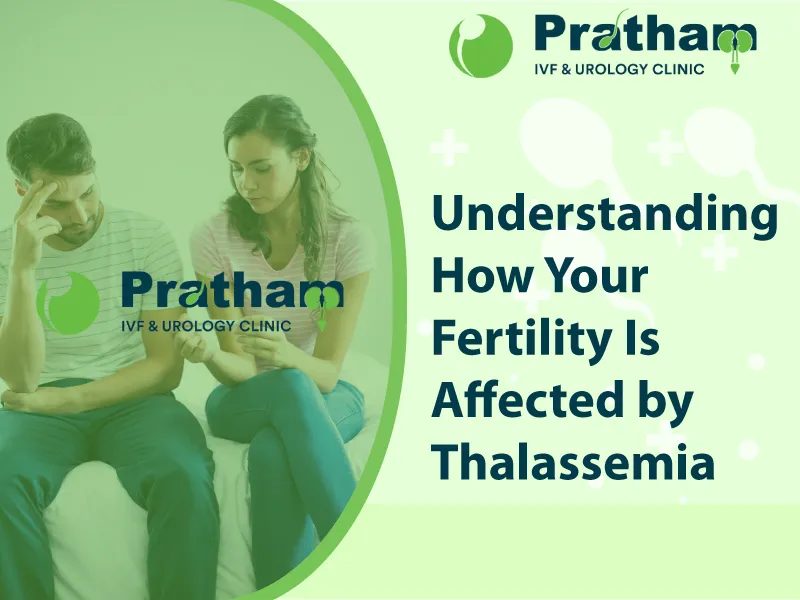
Introduction
Thalassemia is a genetic blood disorder that affects the body's ability to produce hemoglobin, leading to anemia and other health complications. While this condition is widely known for causing fatigue, weakness, and organ damage, its impact on fertility is often overlooked. Many individuals with thalassemia major or thalassemia minor face difficulties in conceiving, making it crucial to understand how this condition affects reproductive health and what can be done to improve the chances of having a successful pregnancy.
At Pratham IVF, we specialize in fertility treatments for individuals with genetic disorders, offering advanced reproductive solutions to help couples achieve their dream of parenthood. In this blog, we will explore how thalassemia affects fertility, the risks involved, and the available treatments to improve reproductive outcomes.
What is Thalassemia?
Thalassemia is a hereditary blood disorder where the body produces abnormal hemoglobin, leading to the destruction of red blood cells and causing anemia. The severity of the condition depends on the type of thalassemia:
- Thalassemia Minor (Carrier State): Individuals have one mutated gene but usually do not experience severe symptoms. However, they can pass the condition to their children.
- Thalassemia Major (Severe Form): Individuals inherit two mutated genes, leading to chronic anemia and the need for regular blood transfusions and medical management.
- Thalassemia Intermedia: A moderate form between minor and major, where symptoms are significant but do not always require frequent blood transfusions.
Understanding thalassemia and fertility is essential for individuals who are planning to conceive and want to minimize risks for themselves and their children.
How Does Thalassemia Affect Fertility?
Fertility complications in individuals with thalassemia arise due to multiple factors, including iron overload from frequent blood transfusions, hormonal imbalances, and delayed puberty. Below are the primary ways thalassemia impacts fertility:
-
Hormonal Imbalances & Delayed Puberty:
People with thalassemia major often experience delayed puberty due to iron deposits in the pituitary gland, affecting the release of reproductive hormones like FSH (Follicle Stimulating Hormone) and LH (Luteinizing Hormone). This can lead to:
- Irregular menstrual cycles or absence of periods (amenorrhea) in women
- Low sperm count and testosterone levels in men
- Poor egg and sperm quality, reducing the chances of conception
-
Iron Overload and Its Effect on Reproductive Organs:
Individuals with thalassemia major require frequent blood transfusions, which often result in iron overload. Excess iron gets deposited in organs like the liver, heart, and endocrine glands, causing:
- Ovarian dysfunction and reduced egg reserve
- Testicular damage, leading to low sperm production
- Increased risk of miscarriage due to poor embryo quality
-
Increased Risk of Genetic Transmission:
If both partners carry the thalassemia gene, there is a 25% chance their child may inherit thalassemia major. Couples with thalassemia minor must undergo genetic counseling before conception to assess carrier risks and explore reproductive options.
-
Complications During Pregnancy:
Women with thalassemia who do conceive face increased risks of:
- High-risk pregnancy due to anemia and iron overload
- Gestational diabetes and high blood pressure
- Poor fetal growth and premature birth
- Increased risk of miscarriage due to hormonal imbalances
Given these complications, individuals with thalassemia who wish to conceive must undergo comprehensive fertility evaluation and management.
Fertility Treatment Options for Individuals with Thalassemia
At Pratham IVF, we offer specialized fertility treatments for individuals with thalassemia, helping them conceive safely and successfully.
-
Preconception Counseling and Genetic Testing:
For couples where one or both partners have thalassemia, genetic screening is essential to assess the risk of passing the condition to their children. Testing includes:
- Hemoglobin Electrophoresis: Determines if one or both partners are thalassemia carriers
- Preimplantation Genetic Testing (PGT-M): Screens embryos for thalassemia mutations before implantation in IVF treatment
-
Hormonal Therapy for Ovulation and Sperm Production:
Individuals with hormonal imbalances due to iron overload may require hormone replacement therapy (HRT) to stimulate ovulation in women and sperm production in men.
- Ovulation Induction: Using medications like Clomiphene Citrate (Clomid) or Letrozole to stimulate egg release
- Hormone Injections for Men: Boosts testosterone and sperm production
-
Assisted Reproductive Technology (ART) for Thalassemia Patients:
For couples with thalassemia-related infertility, assisted reproductive technologies (ART) provide the best chances of conception:
- In Vitro Fertilization (IVF): Eggs and sperm are fertilized outside the body, and only healthy embryos are transferred
- Intracytoplasmic Sperm Injection (ICSI): Helps men with low sperm count achieve successful fertilization
- Egg Freezing (Oocyte Cryopreservation): Recommended for women with thalassemia who wish to preserve their fertility before iron-related ovarian damage
- Donor Egg or Sperm Options: If egg or sperm quality is poor, donor options may be considered
-
High-Risk Pregnancy Management:
Women with thalassemia who conceive require close monitoring throughout pregnancy to reduce complications:
- Frequent Blood Tests: To monitor hemoglobin and iron levels
- Specialized Prenatal Care: Managing risks like gestational diabetes and anemia
- Planned Deliveries in a Specialized Facility: Ensuring safe labor and postpartum care
Why Choose Pratham IVF?
At Pratham IVF, we understand the unique challenges individuals with thalassemia face when trying to conceive. Our expert fertility specialists offer personalized treatment plans, including genetic counseling, hormonal therapy, IVF, ICSI, and egg freezing, ensuring that every patient receives the best possible care. With state-of-the-art technology and advanced reproductive techniques, we provide high success rates while prioritizing patient safety. Our compassionate approach and commitment to ethical fertility solutions make us the leading IVF center in Ahmedabad for individuals with genetic disorders.
Conclusion
Thalassemia presents unique fertility challenges, but with early intervention and advanced reproductive treatments, individuals can still achieve their dream of parenthood. Genetic testing, assisted reproductive technology, and specialized fertility management play a crucial role in overcoming thalassemia-related infertility.
At Pratham IVF, we provide the best fertility solutions for individuals with thalassemia, offering cutting-edge treatments and compassionate care.
Take the Next Step Toward Parenthood!
Are you concerned about thalassemia and fertility? Call us at +91 9879780105 or Book Your Appointment Today at Pratham IVF to explore safe and effective fertility options tailored for you!
 Ahmedabad Top Rated IVF Center
Ahmedabad Top Rated IVF Center




